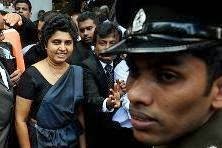 |
| Unlawful Impeachment of the Chief Justice was a blow to Rule of law in Sri Lanka |
National Peace Council release
The Sri Lankan government has rejected the report submitted by the UN Human Rights Commissioner that recommends an international inquiry into alleged war crimes and human rights violations in the last phase of the country’s war. The government continues to deny the allegations and asserts that it only carried out a humanitarian rescue operation during the last stages of the war due to the forcible holding of the civilian population by the LTTE and also asserts that the alleged number of persons who had died or disappeared as a gross exaggeration.
It set up an inquiry but entrusted it to the military against whom the allegations are made, which does not make it an independent investigation. It is an accepted principle in law that no person can be a judge in their own cause.
The last resolution that was passed in the UNHRC called for an independent and credible domestic investigation. Sri Lanka possesses individuals who have held very high positions both internationally and nationally in human rights investigations, and who could be acceptable to all stakeholders. But with the erosion of the Rule of Law and the independence of the Judiciary with the 18th Amendment and impeachment of the Chief Justice, it is unlikely that the UN would accept a purely domestic investigation as a credible alternative at this time. It is reported that the Western countries, led by the United States, are proposing to pass a resolution at the forthcoming session of the UN Human Rights Council in Geneva that would pave the way for the establishment of an international investigatory mechanism.
The National Peace Council is concerned that the outcome of the confrontation that is taking place between the Sri Lankan government and those countries that seek to set up an international mechanism against its wishes will stir up hatred and antagonism against the ethnic and religious minorities who having been the victims and can be accused of supporting the UNHRC resolution. There is already increased polarization on the issue within the country with one-sided accounts of the past being actively propagated by the two sides. The Northern Provincial Council, which represents the people in whose midst the last phase of the war was fought, has resolved to support the call for an international investigation.
Apart from the increased internal polarization, which is not conducive to national reconciliation, the National Peace Council is concerned that in the aftermath of a divisive UNHRC vote, there can be further adverse economic and political consequences for Sri Lanka, including isolation from the powerful Western bloc of countries which constitute Sri Lanka’s main source of exports, and even leading to bilateral sanctions. It is necessary to come up with a modified resolution where both the UN and the government can be partners of a domestic investigation process which will be credible in the eyes of the UN and all stakeholders.
The National Peace Council therefore calls on the international community and the Sri Lankan government to resolve their differences through such a joint inquiry with a report back mechanism to the UN. This could avoid the weaknesses of a previous joint effort to investigate human rights violations that led to the setting up of an Independent International Eminent Group of Persons to be observers. In addition, provision could be made for the inquiry to take place in a neutral country as well as in Sri Lanka so that those who make the allegations can be assured that they would not be penalized for giving evidence for or against the allegations.